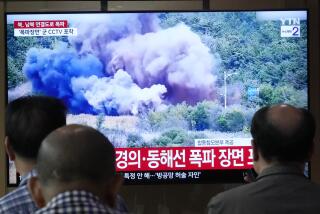Angry Villagers Storm U.S. Bombing Range in S. Korea
- Share via
SEOUL — th Korean villagers demanding that a U.S. Air Force bombing range be closed scaled fences and stormed the range, injuring 10 U.S. guards, military officials said Tuesday.
About 100 farmers and villagers attacked the Kooni range, about 70 miles southwest of Seoul, on Monday night, said Sgt. Will Baker, an Air Force spokesman.
The protesters assaulted U.S. military guards with clubs and rocks, slightly injuring 10 of them, he said. A Korean civilian worker also was beaten, Baker said.
He said Air Force personnel retreated to a dormitory after one attacker pulled out a knife. The villagers then hurled rocks through windows, he said.
The protesters also damaged 22 military vehicles including trucks and looted and ransacked administrative buildings, Baker said.
About 450 South Korean riot police arrived about two hours after the attack began and drove the protesters out, police said. Twenty villagers were arrested, they said.
The U.S. Air Force base in the central city of Osan dispatched a team of 24 security police to the range by helicopter, but there were no clashes between the security police and the attackers, Air Force officials said.
The attack came after villagers were stopped for safety reasons from working in fields on the edge of the range during a bombing practice, officials said. Farmers are allowed to use government land around the range.
Air Force officials said the attack caused extensive damage but gave no figures. South Korean news reports put the damage at about $250,000.
Complain of Noise, Danger
Villagers who live near the bombing range have complained of noise and danger from military jets conducting bombing practice.
The U.S. Air Force began using the range at the end of the 1950-53 Korean War. The United States has about 43,000 troops in South Korea under a mutual defense treaty.
The attack did not appear to be related to calls by some anti-government groups for the expulsion of U.S. forces from South Korea.
South Korean dissidents and radical students have staged violent anti-U.S. protests to denounce the United States for supporting the government of President Roh Tae Woo.
More to Read
Sign up for Essential California
The most important California stories and recommendations in your inbox every morning.
You may occasionally receive promotional content from the Los Angeles Times.








